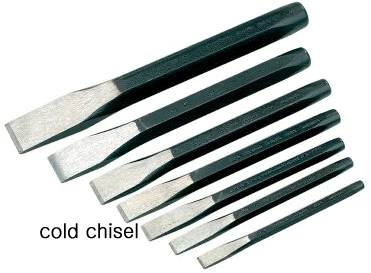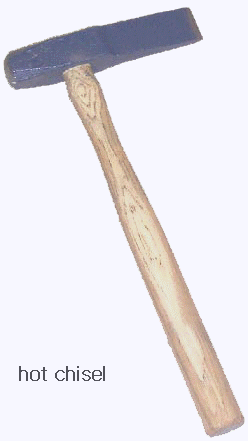|
A chisel is a tool with a characteristically shaped cutting edge (such that
wood chisels have lent part of their name to a particular grind) of blade on
its end, for carving or cutting a hard material such as wood, stone, or metal.
The handle and blade of some types of chisel are made of metal or wood with
a sharp edge in it.
In use, the chisel is forced into the material to cut the material. The driving
force may be manually applied or applied using a mallet or hammer. In industrial
use, a hydraulic ram or falling weight ('trip hammer') drives the chisel into
the material to be cut.
Metalworking
Chisels used in metal work can be divided into two main categories: cold chisels
and hot chisels.
Cold chisel
A cold chisel is a tool made of tempered steel used for cutting 'cold'
metals, meaning that they are not used in conjunction with heating torches, forges,
etc. Cold chisels are used to remove waste metal when a very smooth finish is not
required or when the work cannot be done easily with other tools, such as a
hacksaw, file, bench shears or power tools.
The name cold chisel comes from its use by blacksmiths to cut metal while it
was cold as compared to other tools they used to cut hot metal. This tool is also
commonly referred to by the misnomer coal chisel. Because cold chisels are used
to form metal, they have a less-acute angle to the sharp portion of the blade
than a woodworking chisel. This gives the cutting edge greater strength at the
expense of sharpness.
Cold chisels come in a variety of sizes, from fine engraving tools that are tapped
with very light hammers, to massive tools that are driven with sledgehammers.
Cold chisels are forged to shape and hardened and tempered (to a blue colour)
at the cutting edge.
The head of the chisel is chamfered to slow down the formation of the mushroom
shape caused by hammering and is left soft to withstand hammer blows.
The are four common types of cold chisel. These are the flat chisel, the most
widely known type, which is used to cut bars and rods to reduce surfaces and to
cut sheet metal which is too thick or difficult to cut with tin snips. The cross
cut chisel is used for cutting grooves and slots. The blade narrows behind the
cutting edge to provide clearance. The round nose chisel is used for cutting
semi-circular grooves for oil ways in bearings. The diamond point chisel is used
for cleaning out corners or difficult places and pulling over centre punch marks
wrongly placed for drilling. Although the vast majority of cold chisels are made
of steel, a few are manufactured from beryllium copper, for use in special
situations where non-sparking tools are required.
Hot chisel
A hot chisel is used to cut metal that has been heated in a forge to soften
the metal. One type of hot chisel is the hardy chisel, which is used in an anvil
hardy hole with the cutting edge oriented up. The hot workpiece cut is then
placed over the chisel and struck with a hammer. The hammer drives the workpiece
into the chisel, which allows it to be snapped off with a pair of tongs.
|


